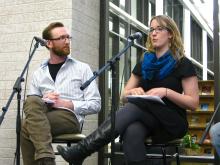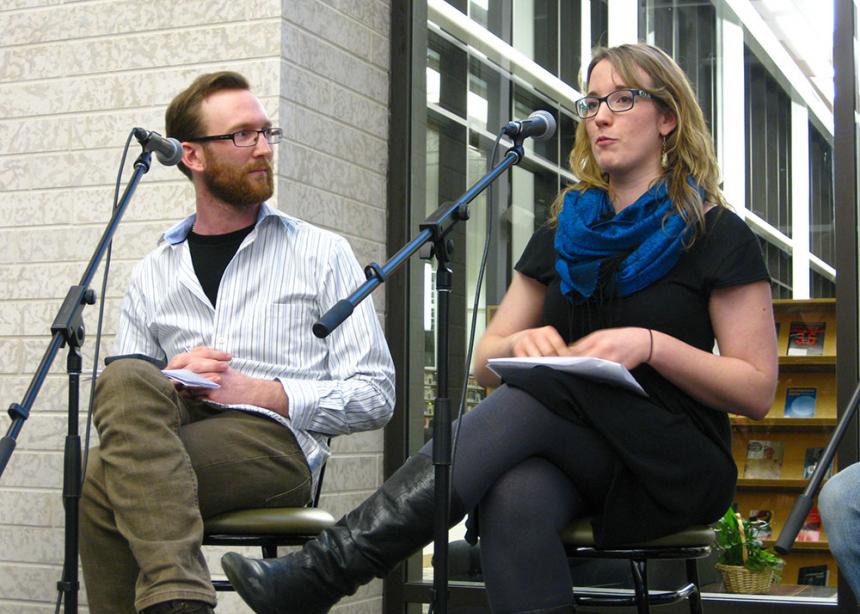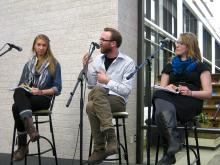For years, congregations have searched for a secret that will keep young people in the pews. Debates are had around worship style, young adult groups and the role parents play.
At “You lost me,” a recent Canadian Mennonite University (CMU) event, four young adults—Kirsten Hamm-Epp, Harrison Davey, Danielle Morton and Lukas Thiessen—thought out loud about why their generation might be leaving the church.
Hosted by Irma Fast Dueck, assistant professor of practical theology, and Peter Epp, a student in CMU’s Graduate School of Theology and Ministry, the panel did not uncover any one secret, but the discussion raised themes around why young adults might be leaving.
1. Nobody involves them in shaping the church
Morton said many of her peers feel like the church doesn’t need them. It seems that “all that the congregation needs from them is to come sit in the pew,” which isn’t enough for a generation that wants to take action.
Youth and young adults in Saskatchewan have told Hamm-Epp, who is area church youth minister for Mennonite Church Saskatchewan, that they want to be involved in worship by doing more than reading pre-assigned Scripture. “Ask us in person and ask us to be involved in shaping it,” she said.
With that involvement comes letting young adults have control over the product. Davey said that, regardless of worship or music style, “I really think it has more to do with creating a spot to release creativity or release ownership to different people in your congregation.”
2. There’s no practical outlet for social justice
Although church communities may talk about social justice, Hamm-Epp said that sometimes young adults don’t find concrete actions to take part in. They find congregations preoccupied with task forces and processes. And while she said that most young people know that is impor-
tant, “you can only handle so many of those [meetings] about buildings and budgets, and then you want to get involved in being the hands and feet of Jesus.”
Audience member Vinh Huynh challenged churches to take action on social issues such as resettling refugees. There are many important issues facing society, he said. “If the church takes the lead on addressing it, we will be ‘attractional.’ ”
3. You’re trying too hard (with worship, that is)
Adjusting music and worship styles seems like an easy place to start attracting young adults. While Morton appreciates the effort, she thinks it is more important for churches to be true to their congregants: Don’t disregard current members in hopes of attracting new ones. “Nothing is going to attract people more than to truly be who you are,” she said.
4. They might not want church the way you imagine it
“Is Sunday morning worship the legacy of the church?” asked audience member Lisa Richard, when Dueck wondered whether young adults felt responsible for carrying on the church. “Do I feel responsible for Sunday morning services happening in a building every week? No. But as a Christ follower, do I feel responsible to maintain the legacy of the kingdom of God? Very much so.”
Samantha Klassen, another audience member, suggested that to keep young adults it is important to remember the difference between meaningful tradition and traditionalism for the sake of keeping things the same. “I think it’s important for us to hold loosely the way that things have always been,” she said. While young adults appreciate the grounding traditions provide, she said they also want space to ask questions.
5. They’re too individualistic (or there’s no space for debate)
It’s an open question whether millennials are the most individualistic and entitled generation in history, but Hamm-Epp said that it is possible that highly educated young people raised to believe they are special might not see the value in churches and community decision-making.
“We’re not raised in a way anymore to think that a larger collective can prove me wrong, or that a larger collective should give me the core set of values,” she said.
As a response to that individualism, Davey suggested that young adults may be interested in being part of a congregation that allows them to ask questions about its practices and beliefs.
Ultimately, there was no single answer for how churches can keep young adults. What to do with that uncertainty?
Morton had a simple suggestion that could lead to many new places: “I think it needs to start with prayer. And it needs to start with our hearts truly being in the right place, and not getting all caught up in technicalities and political issues within the church, but with Jesus Christ.”
Emily Loewen is a writer and editor living in Winnipeg. She is a member of Langley Mennonite Fellowship, B.C., and attends St. Benedict’s Table in Winnipeg.

Harrison Davey, left, and Danielle Morton participate in a panel discussion at CMU exploring why young adults choose not to attend church.




Add new comment
Canadian Mennonite invites comments and encourages constructive discussion about our content. Actual full names (first and last) are required. Comments are moderated and may be edited. They will not appear online until approved and will be posted during business hours. Some comments may be reproduced in print.